If it Weren't for your Gumboots: An interview with Bata
In our final Business story for 2024, we learn more about Wellington footwear manufacturer, Bata. Tucked away in Owhiro Bay, Bata have been making footwear for Kiwis for nearly 75 years.
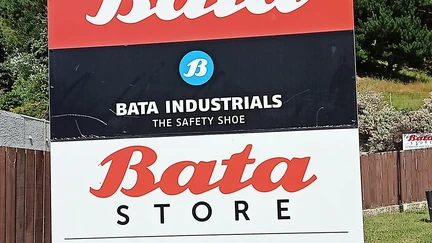
If you grew up in 1970s Aotearoa you’ll probably recall the advertising refrain “Cap, shirt, Bata bullets”. All the cool kids wore Bata bullets. And many from that era were also dressed in Bata school shoes.
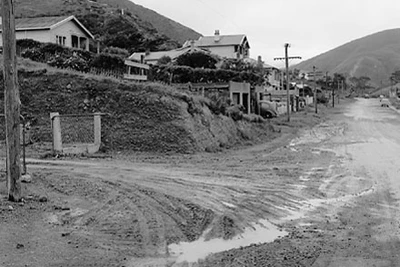
Wellington City Council Archives, 00158-203 (sheet 351)
Corner of Bata Place and Happy Valley Road
Streetscape, Happy Valley Road, Happy Valley (1954)
Bata was founded in Czechoslovakia by the entrepreneurial Bat'a family in the mid 1890s. It spread throughout the world, becoming one of the first truly international brands. Today the iconic Bata name can be found in around 70 countries including New Zealand, where the company established itself in 1948, opening a manufacturing arm tucked away in a quiet corner of Wellington’s South Coast in 1951.
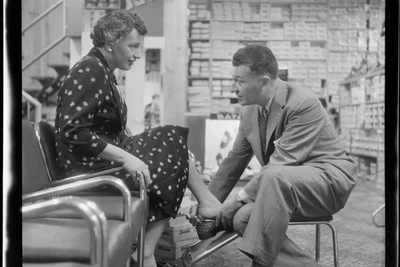
Ref: EP/1958/1060-1-F. Alexander Turnbull Library, Wellington, New Zealand. /records/22396095
Mr Thomas J Bata II, assisting an unidentified woman try some slippers on. Evening post (Newspaper. 1865-2002) :Photographic negatives and prints of the Evening Post newspaper.
Initially manufacturing slippers, Bata’s New Zealand factories – in Wainuiomata, Nelson, Masterton, Carterton and Whanganui as well as Owhiro Bay - diversified over the decades and from the late 1960s turned out over 10 million pairs of Bata Bullets. Ironically our much loved sneaker was, in fact, an American design having originally been made for a Bata sponsored American basketball team, the Baltimore Bullets. A decade ago, this iconic footwear had a short-lived resurgence.
In its heyday Bata employed more than 360 people across its New Zealand operations. With competition from the Asian market in the 1980s impacting the New Zealand shoe industry, Bata was forced to reduce its holdings and adapt to market changes. Now, nearly 75 years later the company’s staple is work and safety boots. Anyone working in the food processing industry in Aotearoa - fish processing, dairy industry etc - is probably wearing Wellington made, Bata gumboots.
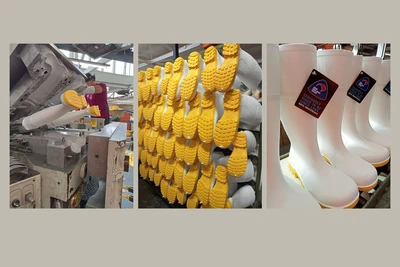
Gumboots, they are wonderful, gumboots, they are swell
‘coz they keep out the water, and they keep in the smell.
Source
In any given year Bata’s 19 staff manufacture and sell 150-200 000 pairs of pvc gumboots primarily to a New Zealand market, with some exported to the Pacific. All made in Owhiro Bay, Poneke. They also operate a warehouse and retail outlet for imported shoe brands that are part of the Bata label and European brand Rieker, for whom they are the New Zealand agent.
Bata Brands is still a privately owned family business, with head office now in Switzerland but Bata’s commitment to the New Zealand business remains. In 2012 investment of $1 million worth of manufacturing plant allowed more efficient production of the pvc gumboots – six minutes to make a pair - and was formally opened by then Prime Minister John Key. More recently Olympian Tom Walsh has been acting as a brand ambassador for Bata safety boots.
In this final blog for 2024 WCL headed to the South Coast to talk to Jason Layton, Bata's Territory Manager about manufacturing footwear in 21st century Aotearoa.
WCL: Why was the time right to open a NZ Bata factory immediately after WW2? Why Owhiro Bay?
Jason: It was a point when, post war, a lot of businesses were looking around and were growing. They were looking globally where they could expand. They were looking for spots around the city fringes as there was reduced costs on shipping and things like that.
The original plan was that Bata bought a lot more land than we are on now. They were looking at creating a community, not just a manufacturing side, but being able to house everyone who worked there. So at that point it was vacant land and available. [In the end] that didn’t come to fruition but that was the idea they had. It started with the factory but I’m not sure if there were any houses built by Bata. Over the years the land got sold off. The street, Bata Place, got gifted to the Wellington City Council about 20 years ago. It was able to be called Bata Place because it was a private street.
WCL: Today only gumboots are manufactured on this site. Why gumboots?
Jason: It’s down to labour costs. Looking at our leather industrial boots which retail from $100-$300 a pair, if we were manufacturing those in New Zealand we would probably quadruple the cost which would put us out of the market.
But with pvc and our injection moulding system, we can still be quite competitive with everything that is imported from China.
WCL: Who is your customer base and what percentage of market share do you have?
Jason: Our customer base is anyone who needs any kind of safety footwear. It’s wide. We have people in warehousing, through all the tradies, mechanics, and then food processing. In terms of our pvc gumboots we have about 90 percent of the food processing market in New Zealand. Our Safemate whites and Safemate blacks are all food hygiene standard. It resonates having a New Zealand made product.
In terms of supply, one bonus we have is that with a New Zealand made boot we can ramp up production as and when needed as opposed to the imported stuff. With those there could be a three month wait before you get a restock.
Some of the food manufacturing factories might pump through a pair of gumboots per staff member every three to four months. It depends on the wearer, role in the factory and so on. If we were low on stock on the white, we can ramp up to keep up.
We don’t sell direct to end users – we sell to distributers and retailers so we don’t know one hundred percent where they end up.
There’s been a lot of redundancies in the food service industry over the last year so there’s a lot less boots going out. When you’re forecasting it goes up and down and the economic climate can throw it out as well.
WCL: I understand the boots are made for wider NZ feet? Are there men’s and women’s designs?
Jason: Essentially they are made purely for the Kiwi flat, wide foot. A lot of the molds have been around for a while. When you’ve got a product that works stick with it. With the ladies you downsize two sizes to get a fit.
We have a six month warranty on our boots.
WCL: Is a specialised skill set required to work here?
Jason: People can learn on the job. It’s like anything, you can learn skills on the job if you have the right person with the right attitude, they can learn anything. It’s basically warehousing, manufacturing, customer service and sales.
WCL: What challenges does the manufacturing industry face in New Zealand at the moment?
Jason: It’s the global economic climate. Cost of raw materials, shipping costs, labour costs. With pvc and injection molding we can keep those costs down. No one produces a leather safety boot in New Zealand and we’re the only manufacturer of pvc boots. It’s purely because the system we’ve got – importing raw material in containers as opposed to finished product is quite specific to gumboots.
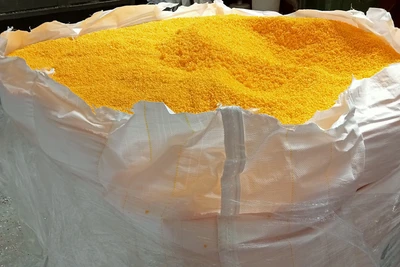
PVC chips ready to be molded into gumboot soles
WCL: Tell us about the PVC recycle programme you’ve set up?
Jason: Our ultimate goal is we’d like to keep 150 000 – 200 000 pairs of gumboots that we produce annually here out of landfill. It’s still in the early stages, but we are working with our larger end users and supply them with empty crates. As they go through boots, they clean those and put them into the crate and ship them back to us.
We put the boots into a chipping system and chip up the pvc. We have a shaker which takes out the fluff from the liner, separate that, and we have all the clean pvc pellets which then gets blended into the virgin pvc pellets and goes into the injection molding.
With our white gumboots, on the shaft of those we can have 20 or 30 percent recycled material and in the black shaft boots we have up to 50 percent recycled material. We keep the sole as virgin pvc so we have no variants when it comes to food servicing and grip, but we can blend the recycled pvc into the shaft. Our Ecomate gumboot has a 100% virgin pvc sole and the upper is 100% recycled pvc.
Everyone is looking at whatever they can do to minimise their impact on the environment, so the cost of sending the boots back is on the end user and there’s probably not too much difference between that and the cost of sending them to landfill.
They understand when they are pumping through 30 000 pairs of gumboots each year, that’s a lot of space in the ground being filled with pvc. If they can send it back, put it through recycling you end up wearing a gumboot made of recycled New Zealand made gumboots. In a small country this can make a huge impact.
Watch
WCL: What’s do you think is the secret to Bata’s longevity?
Jason: Being family owned. I’ve only been here a year but it’s like a second family to me. There’s a lot of staff who have family members or friends working here and have been here for years. We all feel one and the same. There’s no separation of corporate levels. When someone from head office in Australia comes over we can all sit down and talk on the same level which is quite nice. Everything is open. That stems from being a family business.
WCL: What does the future hold?
Jason: Focus on our industrial side, growing that more and getting some more market share for the leather side of our industrials and seeing some different industries in terms of our pvc. We’re always looking at what we can do and where we can fit in the market. Essentially we have the food industry but when it comes to rural we dabble in that but we’re always looking at how we can develop boots that fit into those areas. We look at what we can do on a local level – we work with what works here and how we can make that best.
WCL : Final – most important question - do you think Santa wears Bata workboots? He’d be a good international brand ambassador.
Jason: I’d like to say yes. If he needs a pair tell him to come talk to me.